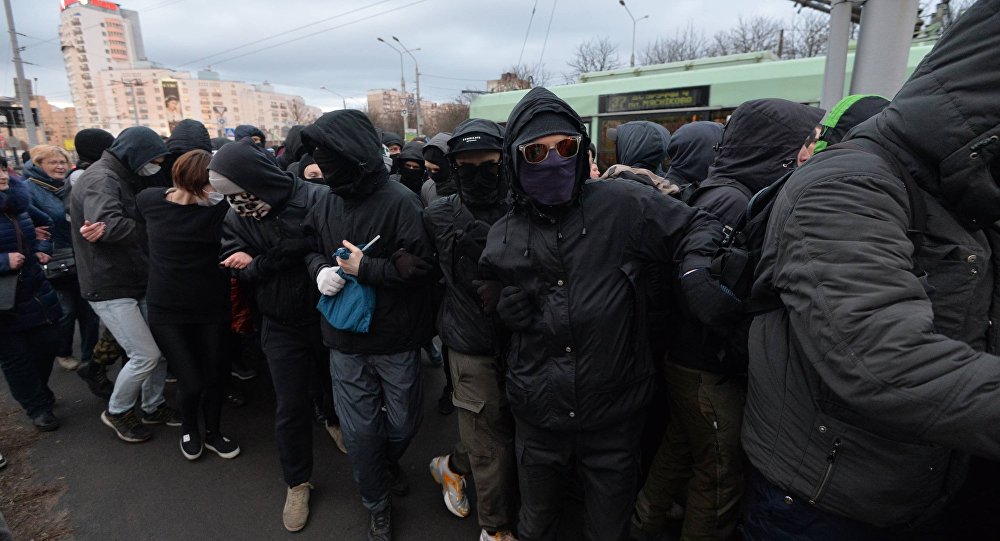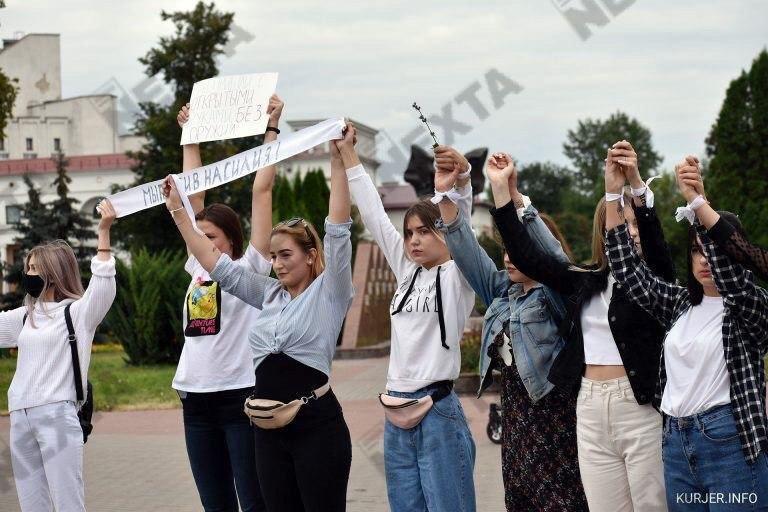Mikola Dziadok, a representative of the anarchist movement, tells us about the reasons of the ongoing anti-anarchist campaign in Belarus.
MD: Today the state media are waging a full-fledged informational war against the anarchists. A substantial part of the propagandist documentary “Calling a friend” deals with the anarchists. A big article has been published in the nation-wide presidential newspaper and republished in many regional newspapers. Recently, a wannabe “scientific research” on anarchism, – a parody, in fact, – appeared on the Ministry of Interior webpage, etc.
RR: Do they want to smash the anarchists?
MD: Well, they have several reasons for doing this, and the main one is that the state is afraid of the anarchist movement. This is because the state can’t control the movement. Belarusian police and secret services do know how to control the traditional opposition, directly and indirectly, because they have been coexisting with it for a very long time. The oppositional parties and movements are centralized institutions, organized according to the hierarchy principle. It would suffice to control or isolate their leader(s) to get a full control of the whole party/movement, as they did with Mikola Statkevich, who was isolated just before March 25th and May 1st. The authorities know who, in the opposition, is to be bribed, intimidated or just arrested: these are the tactics they have been using for years. The KGB has its “own” oppositionists, journalists, human rights defenders, and all of them do what the KGB needs them to do. This is why the Belarusian democratic movement, in its present shape, will never come to power.
RR: And this is not the case with the anarchists?
MD: There is no way of making a deal with the anarchists in order to make them do what the government wants. Of course, individuals can be intimidated and forced to collaborate (there were such cases among the anarchists), but to a little avail. Because, first of all, there is no hierarchy in the anarchist movement, no formal leadership, no cult of the leader. Second, the anarchist structures are not centralized. And, last but not least, anarchists take good care of their security, which is called “secrecy” in police reports.
But, to face the truth, the Belarusian anarchist movement is not powerful enough, even compared with other oppositional groups. There is no mass militancy, no significant technical or financial resources. Of course, it is very unlikely that today or tomorrow the anarchists will take over and make Belarus an anarchist commune.
RR: Why then are the repressive forces and the state media so alarmed?
MD: Because they still don’t know how to take us under control. In this informational war the state is proceeding in a very uninventive and stupid way. They just repeat a hundred years old arguments against anarchism. They try to present anarchists as commonplace vandals or terrorists, which is preposterous. All the anarchist actions that ever involved destruction of property in Belarus were accompanied with detailed explanations of their political motives, they had nothing to do with vandalism. As for terrorism, their claim is equally absurd. The Belarusian state is still practicing death penalty and as such has no moral right to call anyone “a terrorist”. Especially not the anarchists, who stick to the humane principles and, in most cases, chose non-violent methods of resistance.
RR: Maybe, the media prepare the public for a “crusade” against the anarchists?
MD: Everything is possible. They may be “pumping up” the public opinion before mass repressions against anarchists. But the past political trials in Belarus show that the authorities first arrest their opponents and only ex post explain to the people why. That was the case with the anarchists in 2010 and 2011, this is the case with “The White Legion” now. Therefore I think that the real goal of this informational war is to react to previous events, “to catch the ship that has sailed”. In spite of the state’s supremacy in resources, it plays “second fiddle” in this conflict, trying to counterweigh the anarchist’s outstanding and successful engagement in the Spring protests and to hold back the expansion of the anarchist movement.
It wouldn’t suffice to make massive arrests in order to eradicate the movement. Of course they can put the most active people in jail, but in 2 or 3 years the movement will recover and new people will replace the imprisoned comrades, as it has happened before. The state could eliminate or essentially reduce the power of the anarchist movement only by “tightening the screws” in every sphere of social life and in every social institution. That would basically mean imposing a military dictatorship in Belarus.
In general, I don’t think that the secret services want to eliminate the anarchist movement or the opposition. They understand that there would be “divergent people” anyway. Their goal is not to destroy, but to control. Their strategy consists in fencing the paddock and then, once in a while, picking a victim for an exemplary punishment.
RR: What will be the result of the confrontation between anarchists and the state?
MD: As a subject of history, the national state is becoming more and more obsolete. This is something that Karpiankou, Vakulchyk or the entire KGB can’t stop. It is a historical process. It is hard to tell yet, what would replace the national state. One possibility is a federation of communes that are self-governed through direct democracy: this project is making its way already in many parts of the world. We too have a chance to dismantle the state and replace it with a more modern, democratic and egalitarian social formation, the anarchist one. We just have to believe in ourselves and in our cause and we will succeed.




